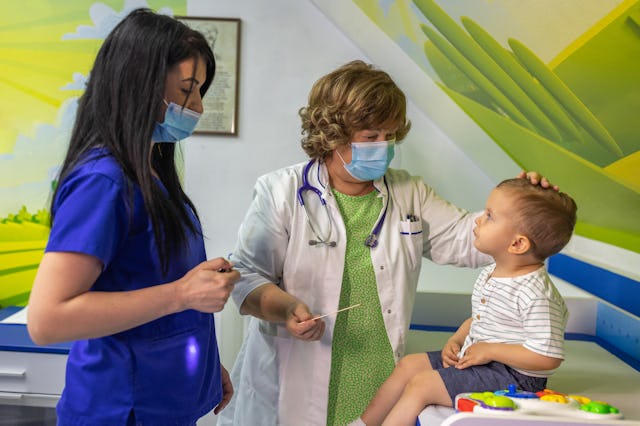Children's Hospitals Are Over Capacity Due To Respiratory Illnesses
It's not just COVID-19, either. Here's why children's doctors are nervous about this winter and an uptick in child respiratory hospitalizations.

Headed into our third year since the COVID-19 pandemic began rocking our world, the country now has approved vaccines, protocols in place, and more normalcy in the classroom than we’ve seen since 2019. But, at least partially because of the pandemic, kids and their parents may be headed into a very rough winter when it comes to viruses. And it’s already started.
The irony? It’s not just COVID, but RSV (respiratory syncytial virus), influenza, rhinovirus and enterovirus that are filling up children’s hospitals across the country.
While an uptick in respiratory viruses is normal in fall as kids return to school and the weather cools, this year viruses are hitting harder and sooner than usual — and landing thousands of kids in the ER and in hospitals until many are at capacity.
“As pediatricians we are accustomed to an uptick in respiratory illnesses each year when school resumes in August and September. Shared germs in a classroom combined with fall seasonal allergies and changing weather impacts many kids' respiratory status,” Shelly Flais, MD, a pediatrician in Naperville, Illinois, and author of the AAP's Caring for your School Age Child, tells Scary Mommy.
“The year 2022 is unusual in that summer really didn't slow down, and we're seeing more respiratory viruses earlier than usual: specifically, RSV and influenza,“ Flais said of her own experiences in her clinic recently. “In many parts of the country, mask mandates were lifted last spring, and young children who had spent their whole lives sheltering in place now are experiencing challenges to their immune system.”
Maya Maxym, a pediatrician located in Hawaii, called out the unusual numbers of sick kids and swirling viruses on Twitter, and dozens of doctors responded with similar reports in their own hospitals.
“Has anybody noticed that children’s hospitals are overflowing?” she asked. “We are inundated with multiple simultaneous respiratory viruses (lots of RSV, rhino/enterovirus, others). Kids can not breathe,” she continued in a thread.
“Many children are visiting the emergency department and being admitted to the medical center with respiratory illnesses. ... Some of them are sicker than what we usually see,” Maxym told TODAY. “Cases appear to be higher than ‘busy seasons’ prior to the COVID-19 pandemic.”
In fact, RSV cases have tripled for people of all ages in the last week alone — and cases have been more severe than usual, landing a high number of kids in hospitals struggling to breathe. The virus usually peaks in January or February.
Doctors in Boston, Indianapolis, Dallas, and New Orleans reported full children’s hospitals this week, just to name a few.
Earlier this summer, doctors in Australia warned the U.S. that they were seeing a devastating flu season for kids — and that it was making its way toward North America.
"Sixty percent of the hospitalizations in Australia have come from pediatric age groups, 16 and under, and that’s highly unusual,” Dr. Gregg Sylvester told USA Today.
The high numbers made sense — kids hadn’t been exposed to the flu for two years and now it is hitting hard. And while the flu is gaining momentum in places like Texas already, we haven’t seen the worst yet, according to pediatricians. Until everyone gains back a baseline of immunity against these viruses, hospital beds may be rare and kids will be taking the brunt of it.
What can you do to keep your kid safe during what is looking like a banner year for viruses? Flais recommends making sure you and your kids are vaccinated against viruses that have available vaccines (COVID and flu) and that you take sensible precautions against ones that don’t.
“There are many illnesses for which we don't have prevention, but thankfully, there are illnesses for which we do have preventative vaccines,” she tells Scary Mommy. “Talk with your pediatrician to ensure your child is up to date on all recommended vaccines, including covid vaccine boosters. The seasonal influenza vaccine is recommended for everyone 6 months and older, and influenza is already hitting parts of the US. Research shows that kids who get the seasonal flu vaccine are less likely to need the emergency room or be admitted to an intensive care unit.”
While the world can’t hide at home from these viruses indefinitely, individuals can make smart choices that stop spread, like staying in when sick and washing your hands.
“Area pediatric intensive care units are already full of kids with respiratory illness; if we all do our part, we can minimize unnecessary additional illnesses,” she says. “And as always: Please stay home when you're feeling sick or exhibiting signs of illness. Wash your hands with soap and water for 20 seconds ("Twinkle Twinkle Little Star" sung twice), and teach your child to cough/sneeze into the crook of your elbow ("cough pocket") or tissues.”
Another piece of good advice in these scary times for kids? Know when to take your kid into urgent care or the ER if they’re struggling.
“As a parent, you know your child best,” Flais says. “If they're taking fluids well, are somewhat playful, and able to get the sleep they need, most likely you can manage the illness at home. If a child is working so hard to breathe that they cannot drink nor sleep, or are starting to get dehydrated to the point of no urination in over 6 hours, or if you're seeing other signs that don't ‘feel right’, those are signs they need to be brought to medical attention. If fevers persist past 48 hours you should see your pediatrician because the virus may have evolved into a bacterial complication such as an ear infection.”